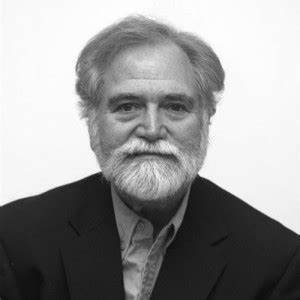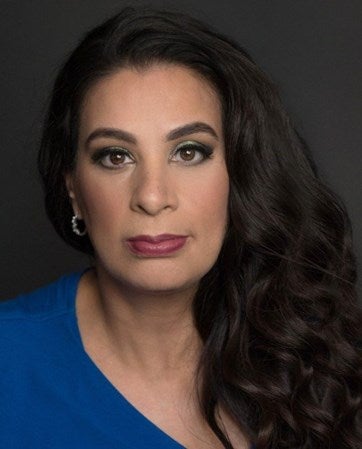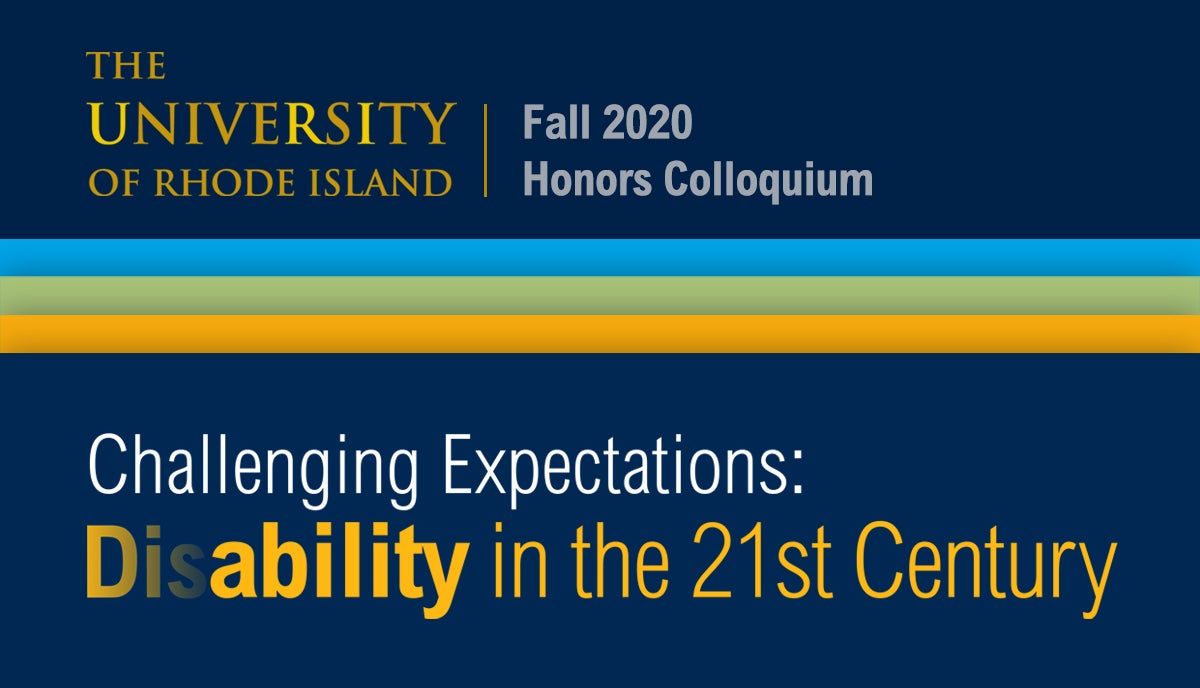KINGSTON, R.I. — Sept. 16, 2020 — The University of Rhode Island Honors Colloquium began in the fall of 1963 after the nation had just experienced the historic March on Washington and Dr. Martin Luther King Jr.’s historic address. And in November, the nation sobbed in collective grief when President John F. Kennedy was assassinated.
During its 57 years, the colloquium has never wavered in its commitment to bring compelling, controversial, sometimes funny and even outlandish speakers to the URI and broader community even as the nation, state and world faced war, financial crisis, despoiling of the environment, or celebrated victories like humans walking on the moon, the Civil Rights Act and the Clean Water Act.

But colloquium organizers have never had to offer the series in the midst of a global pandemic, and never have they had to be more nimble and adaptable to offer this fall’s free, public lecture series, “Challenging Expectations: Disability in the 21st Century.”
This year’s colloquium, which marks the 30th anniversary of the Americans with Disabilities Act, couldn’t be more timely. As technology has been critical in the fight against and response to COVID-19, it has also opened doors over the decades to those with disabilities and changed what we view as possible in everything from education and health care and to sports and entertainment.
For the first time in its history, the series will be held entirely online, Tuesdays at 7 p.m., between Sept. 22 and Dec. 1. To see the complete schedule and to participate online, please go to uri.edu/hc.

“We are going to challenge expectations we all have for individuals with disabilities, including those around inclusion, safety, especially during this pandemic, respect, and how we put limitations on ourselves and others,” said colloquium coordinator Tiffani S. Kisler, associate professor of Human Development and Family Studies in the College of Health Sciences. “This is going to be an interdisciplinary series, during which we will examine numerous topics, including the role of technology to eliminate the concept of disability. People with disabilities are now running marathons.”
Lynne Derbyshire, associate professor of Communication Studies and director of the URI Honors Program, said it is unfortunate that individuals see others through the lens of difference, whether the lens is race, gender or disability.
“It’s important to point out that as groups began fighting for the rights of people with disabilities and their access to all aspects of American life, the first people to respond and support that effort were the Black Panthers,” Derbyrshire said.
“We want people to see possibilities instead of barriers, particularly with all of these advances,” Kisler said. “Also, we can see physical disability, but we need to see the possibilities for those with invisible disabilities.”
Derbyshire noted that more medical schools are no longer looking at students for admission who are at the top of their undergraduate classes or who have the strongest academic records.
“They are now looking at a concept called ‘distance traveled,’ or in other words, who had the farthest to climb, the greatest challenges to overcome to achieve what they have. There is a sense that these individuals will be more empathetic and more tuned into their patients when they become doctors. This would certainly include those with disabilities,” Derbyshire said.
The colloquium begins Sept. 22 at 7 p.m. with the talk, “Disability and Perception,” by Rick Rader, director of the Morton J. Kent Habitation Center, a part of the Orange Grove Center in Chattanooga, Tennessee. The medical doctor is described as a medical futurist, who predicts medical problems of people with neurodevelopmental disabilities. He is responsible for the identification, implementation, and evaluation of novel, innovative and inclusive programs in health care.
Kisler said Rader will address the unrealistic drive for perfection and its profound negative consequences for all individuals and the people they encounter. “Dr. Rader will focus on ways we seek perfection and how that impedes our ability to see ourselves and others as complete and valuable,” Kisler said.
“Whether we have a disability or not we can all feel inadequate,” she added.
The second lecture, “Disability and Entertainment” on Sept. 29, will be given by Maysoon Zayid, a writer and comedian who told the BBC, “It became very obvious to me that in the United States of America, a fluffy ethnic disabled chick was never going to get a job unless she did stand-up.”
Other topics and presentations include a panel on disability and sports with Paralympic athletes, disability and fashion, disability and health care and disability and technology.
Kisler’s fellow colloquium coordinator is Anita Jacobson, clinical associate professor of pharmacy, who teaches in the Integrated Pharmacy Laboratory, which centers on case-based learning, patient simulation activities, motivational interviewing, objective structured clinical examination, and patient counseling.
The colloquium’s advisory committee is made up of: Emily Clapham, associate professor of Health and Physical Education, and director of the Physical Education, Health Education, Teacher Education Program, and coordinator of the Adapted Physical Education Program; and Anne-Marie Dupre, clinical associate professor of physical therapy and assistant director of Clinical Education.

